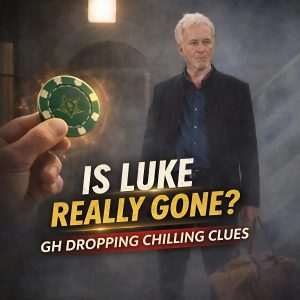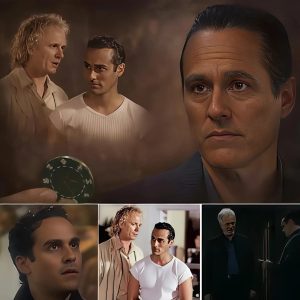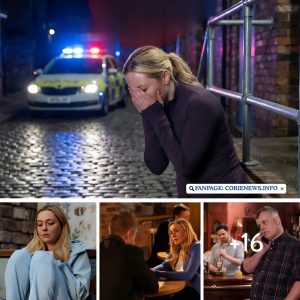In Port Charles, fate has a cruel way of playing with people’s lives, and this time it’s Britt Westbourne who finds herself at the center of one of the most chilling and heartbreaking twists General Hospital has unleashed in years. What should have been her liberation has instead become a nightmare—one that shakes her, her mother Liesl Obrecht, and even Hamilton Finn to their core.
Britt’s daring escape from the secretive Five Poppies facility was supposed to mark her fresh start. After months of captivity, manipulation, and medical experiments, she finally broke free. That moment wasn’t only about surviving; it was about reclaiming her dignity and hope. For a brief, shining instant, she believed she had outrun the shadows that had tormented her. But freedom has a way of cutting both ways. As Britt stepped back into her old life, she realized she had left behind the only thing keeping her alive—the medication that held Huntington’s disease at bay.
That cruel irony gnaws at her every waking thought. She risked everything for freedom, yet in the chaos of alarms blaring and guards closing in, she abandoned the treatment that had given her temporary stability. She remembers how it felt to have her body working again, her tremors under control, her mind clear. Now, that stability is nothing more than a ghost in her bloodstream, haunting her. She is free, yes—but her own body is once again her prison.
Every hour makes the truth harder to deny. Small spasms in her hands, slurred speech, and moments of fog are creeping back. She knows exactly what is coming: the loss of motor control, the slipping of her memory, the cognitive decline she has dreaded her entire life. She has faced enemies before, but this is worse—it’s an invisible countdown inside her, a ticking clock she can neither fight nor bargain with. Her nights are sleepless, consumed by obsessive calculations of how long she has before the symptoms consume her completely.
What makes the torment worse is that she knows the cure exists. She touched it, felt it, lived under its effects, and now it’s gone. That unbearable truth claws at her psyche: she didn’t just lose her freedom to the disease—she lost her only chance at salvation. Britt replays her escape in her mind constantly, wondering if she could have grabbed a vial, a note, anything that might have given her a fighting chance. Regret becomes her constant companion, almost more suffocating than the disease itself.
As her obsession grows, her mind keeps circling back to one person who might be able to help her—her mother, Liesl Obrecht. Liesl has always been a woman of ruthless brilliance, someone who has blurred the line between ethics and desperation in the name of saving those she loves. If anyone could recreate the formula Britt lost, it would be her. But the problem is devastating: Britt brought nothing back with her. No samples, no notes, no formulas—just her fractured memories of what she saw in the lab.
Liesl knows the clock is ticking. The tremors will worsen, the decline will accelerate, and her daughter will die unless she finds a solution. And so, in one of the most staggering turns of events, she makes a desperate choice: she turns to Hamilton Finn.
The history between Liesl and Finn has been filled with conflict and mistrust. They have clashed over science, ethics, and loyalty, often viewing each other as rivals rather than allies. But now, none of that matters. Liesl approaches Finn not as a fellow doctor, but as a mother on her knees, pleading for her daughter’s life. The proud and icy Obrecht trembles as she begs him to help recreate the treatment that once worked on Britt. For Finn, this plea is nothing short of staggering. He has every reason to refuse—Liesl has crossed him before, and what she is asking is nothing short of dangerous. To recreate the formula would mean working outside hospital oversight, cutting corners, and risking everything. But Finn sees the desperation in Liesl’s eyes, and he sees the terror in Britt’s fading strength. Against his better judgment, his compassion wins out. He agrees.

And with that, a dangerous alliance is forged. Liesl and Finn, two brilliant but opposing minds, set aside years of animosity for a singular purpose—saving Britt. They work in secret, pushing themselves to exhaustion. Liesl is consumed by guilt, rage, and paranoia. Every failure feels like a death sentence. She begins to suspect sabotage, questioning hospital supply chains, lashing out at Finn when results don’t come quickly enough. Her obsession becomes so extreme that colleagues notice the change—bloodshot eyes, erratic behavior, and endless hours in the lab.
Finn, for his part, finds himself dragged into a moral gray zone he never thought he’d enter. What began as a reluctant act of compassion turns into a personal crusade. He bends rules, erases records, pulls resources without authorization. As the line between medicine and madness blurs, Finn starts to wonder if he’s saving Britt—or losing himself in the process.
Meanwhile, Britt feels herself slipping further into despair. She isolates herself from those who care about her, hiding her symptoms out of pride. She doesn’t want anyone to see her falter, to pity her, or to know how much time she may—or may not—have left. Instead, she throws herself into research of her own, trying to reconstruct the formula from memory, reaching out to old contacts, sketching chemical structures late into the night. Her obsession isn’t killing her—it’s the only thing keeping her alive.
But both Britt and Liesl know the nightmare isn’t over. The Five Poppies organization still exists, and Britt’s escape may have painted a target on her back. Liesl begins receiving cryptic messages, subtle threats warning her to stop digging. Lab files vanish. Devices glitch. It becomes terrifyingly clear that someone doesn’t want Britt’s survival exposed. And that realization shifts Liesl’s obsession into something darker—revenge. Not only does she want to save her daughter, but she also wants to destroy whoever put Britt in this position in the first place.

And then comes the moment that shakes everything. Against all odds, Finn makes progress. The fragments of Britt’s memory and his own scientific genius allow him to piece together a treatment that just might hold the disease at bay. When he returns with the recreated medication, it feels like a miracle. For Liesl, it is the answer to her desperate plea. For Britt, it is the slimmest chance at survival.
But this is not a simple victory. The cure that Finn brings back is unstable, untested, and dangerous. To use it on Britt could save her—or destroy her faster. And beyond the medical risks lies an even greater threat: the knowledge that this treatment exists outside of official channels. If the truth comes out, not only could careers and reputations be ruined, but Britt herself could once again become a target of those who want the cure buried forever.
And yet, Britt is not the same woman who entered Five Poppies. Her survival has hardened her, sharpened her. She refuses to live in fear again. She knows she is carrying something powerful—something that could change lives, or ruin them. And instead of cowering, she begins to see her ordeal not as a curse, but as a call to action.
For Liesl, the fight has become both scientific and personal. For Finn, it’s a test of conscience and loyalty. And for Britt, it’s the beginning of a transformation. No longer the passive victim of her disease or her captors, she steps into the role of survivor, fighter, and possibly whistleblower.
Port Charles has no idea what storm is brewing. Because Finn’s return with the medication is not the end of the story—it’s the spark of something far bigger. A war of secrets, science, and survival that will pull the hospital, its doctors, and its families into a web of danger that no one is prepared for.
Britt Westbourne’s battle has only just begun.





